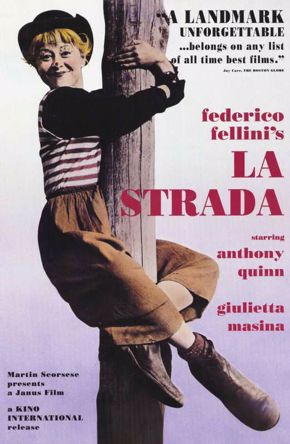Virtual Cinema | Saluting Federico Fellini and His Masterpiece: “La Strada” November 2, 2020

Giulietta Masina in La Strada
Anthony Quinn in La Strada
Giulietta Masina and Anthony Quinn in La Strada
This year marks the centennial anniversary of Federico Fellini’s birth. Perhaps Italy’s best-known filmmaker, Fellini (1920–1993) sprinkled his movies with eccentric characters, surrealistic imagery, and autobiographical elements. Widely considered his masterpiece, “La Strada” tells the story of Gelsomina (Fellini’s wife, Giulietta Masina), a childlike young woman sold to Zampanò (Anthony Quinn), a brutish circus strongman. The 1954 film won the first Academy Award for Best Foreign Language Film.
As Virtual Cinema presents La Strada in a new 4K digital restoration, here’s an inside look from Alessandro Carrera, professor and director of Italian studies at the University of Houston and author of “Fellini’s Eternal Rome: Paganism and Christianity in the Films of Federico Fellini.”
“If I were to send one Italian film in space ... I would send La Strada. It is one of the most moving films that you will ever see, and I think that people on other planets should see it because it says, in a language that anyone can comprehend, that it is right to have compassion. It is right to pity those who, like Zampanò, are big, strong, and scary but carry the misfortune of being born without empathy, intelligence, and humor. It is right to try to make them think, like Gelsomina does, even if it looks like a lost cause. It is right to sympathize with the Fool, the third in a perfect pair, even when he is truly obnoxious and from your seat in the audience you would like to tell him to shut up . . . Zampanò will not let go of you.
“Some critics told Fellini that La Strada was not Bicycle Thieves, it was not socially conscious. He pointed out that there are many more Zampanòs around than bicycle thieves, and how right he was. But there is only one Gelsomina, and only one Giulietta Masina. Fellini could have had all the producers at his command if he agreed to make a sequel, but he said no, and it could not be otherwise. La Strada is whatever you want it to be: Neorealism, the end of Neorealism, a fairy tale, the Beauty and the Beast, a Christian film, a Buddhist film. In the end, it is a message to the universe saying, against all odds, that life makes sense.”
• La Strada WATCH HERE Your ticket ($12) supports the MFAH and provides a 3-day pass to the film. SEE THE TRAILER
Underwriting for the Film Department is provided by Tenaris and the Vaughn Foundation. Generous funding is provided by Nina and Michael Zilkha; The Consulate General of the Republic of Korea; Franci Neely; Carrin Patman and Jim Derrick; Lynn S. Wyatt; ILEX Foundation; L’Alliance Française de Houston; and The Foundation for Independent Media Arts.





